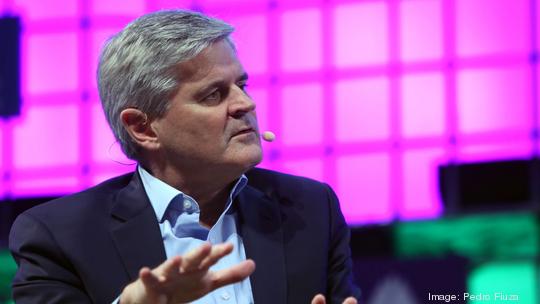
If the American dream is to touch all communities — not just select ones in affluent areas like New York, Boston and Silicon Valley — then the venture capitalists who drive innovation in the economy need to be more intentional about where they invest, says Steve Case, the chairman, CEO and co-founder of the D.C. investment firm Revolution LLC.
In a fireside chat with David Rubenstein, the co-founder and co-chairman of The Carlyle Group, at the Economic Club of Washington, D.C., this week, Case reiterated what many in the audience already knew: that venture capital money flows disproportionately to companies founded by white men in a handful of major metropolitan markets.
But Case believes that a more diverse economy is a healthier economy, and he assured investors that there is money to be made investing in businesses owned by women and people of color in places like Detroit or Chattanooga, Tennessee, and other smaller markets that are emerging as innovation hubs in their own right. Revolution has prioritized such investments through its two Rise of the Rest funds, which he said were showing solid returns, though he declined to get more specific because of Securities and Exchange Commission regulations.
“We said we’re going to generate top-tier returns, and we’re on track to do that,” he said. “It’ll surprise the big coastal money and, over time, you’ll see a shift" to these markets.
Case and Rubenstein shared a stage to promote their recently released books: Case's “Rise of the Rest: How Entrepreneurs in Surprising Places are Building the New American Dream," and Rubenstein's "How To Invest: Masters on the Craft."
Case said bias in VC investing is evident in the numbers.
Citing data from venture data firm PitchBook, he said that just 2.4% of total venture capital money in 2021 went to startups founded solely by women. He also pointed to data from Crunchbase that said of the record $137 billion invested in U.S. startups in the first half of 2021, only 2% of the funding went to women-founded companies and just 1.2% went to Black entrepreneurs. Add in the pre-pandemic stat that 80% of venture funding went to early-stage companies in four states — California, Massachusetts, Texas and New York — and you get a picture of a startup ecosystem that's anything but equitable.
"If you have an idea," Case lamented, “it does matter where you live and it does matter what you look like [to] really have a fair shot at building a company, a fair shot at pursuing the American dream."
Still, progress is being made.
Case noted in the last decade, 1,400 new venture firms have started in cities outside of the top three VC markets of Silicon Valley, New York and Boston.
As he bussed around the country in 2015 and 2019 hosting pitch competitions and investing in startups, Case said he saw firsthand the ingenuity and promise of entrepreneurs outside of the Silicon Valley bubble. That led to the creation of two $150 million Rise of the Rest funds — one closed in 2017, the other in 2019, just months before the pandemic hit — whose backers include the likes of Rubenstein, Amazon.com Inc. founder Jeff Bezos and women's clothing icon Tory Burch.
The Rise of the Rest funds have so far invested in about 200 companies. Case said companies in which they invest must fit four key criteria:
- Its products or services must have potential to improve people's lives. Investments in health care, food or financial services firm fit this bill.
- It must have a use case theory on how to scale the business.
- It must recognize entrepreneurship is a team sport though a diverse team of perspectives.
- It must have the support of partners, such as hospitals or other local institutions or community organizations.
Case's new book details how startups in these under-the-radar cities, like TemperPack in Richmond, Virginia, Freightwaves in Chattanooga and AcreTrader in Arkansas are growing fast and boosting their local economies along the way.
"There was this sense that Silicon Valley had an insurmountable lead because it had this culture around innovation," Case said. "People wanted to be there because it's where most of the venture capital was. It's where most of the successes were. The sense was the Rise of the Rest cities, the only thing they really had going for them was lower cost of living. Now, people realize there's a broader set of advantages some of these cities have."
The pandemic has become a "tipping point" for this so-called Rise of the Rest trend, Case said, as remote work allows companies to hire from anywhere, and gives workers more options around where they live.
He added that now is an especially good time for investors to be hunting for diamonds in the rough as new business formations have surged in the wake of the Covid-19 pandemic.
In July 2020, applications for new businesses increased 95% from the same month a year earlier, to 551,657, and though the pace has slowed since then, they are still at their highest level in a decade, according to U.S. Census data.
"We're trying to not just have a successful fund," said Case. "The broader idea is: If we're going to have a more inclusive innovation economy, we have to be backing entrepreneurs in more places, creating more jobs in more places. The momentum we're seeing on that front is encouraging."
American Inno editor Jim Dallke contributed to this story.



